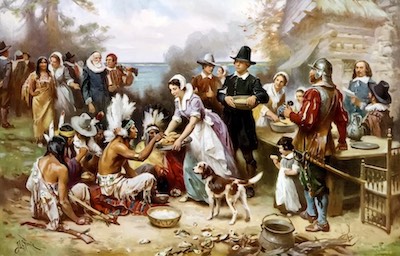
The Pilgrims who came ashore at Plymouth Rock in 1620 were followed by their theological cousins, the Puritans, who established Massachusetts Bay in 1630. They were not the first Europeans, not even the first Englishmen, to settle in North America. Yet they, more than any others, defined an American national identity and laid the foundations for an American political tradition committed to the rule of law and constitutionalism.
The Pilgrims were religious dissenters — theological separatists — who reluctantly concluded that the Protestant Church of England from which they separated themselves was irredeemably corrupt, whereas the Puritans, as their name suggests, held out hope that the church could still be purified. Both were profoundly religious people who had experienced oppression in England at the hands of authorities in church and state, and they crossed the Atlantic Ocean’s treacherous waters to escape religious persecution in the Old World and to seek religious liberty in the New World.
They were on a mission to establish Bible commonwealths grounded on biblical principles and laws as they understood them. These would be political communities devoted to their God and committed to the rule of law. Their bold experiments in self-government produced a constitutional tradition that blended biblical law interpreted through the lens of their Protestant theology, English common law adapted to the needs of their communities, and developing local customs. Key features of that tradition persist to the present day. read more

They wanted to limit the abuses of German George III, with the citizens being the source of power.
Rather than the throne or the office, having to call politicians Honorable is the same as addressing federal inmates as the honorable.
Wow, I was just listening to Steve Bannon’s War Room Thanksgiving edition in which he was interviewing Heather MacDonald, talking about her recent article in The Spectator titled “More Salem Than Thanksgiving”. And then I came back here to see this thread about the Pilgrims.
You absolutely have to hear Bannon’s interview of MacDonald. She’s brilliant and gave a very insightful analysis of how society today compares to the early settlers back in 1620. Spoiler alert: We don’t compare well at all.
Here is the Bannon interview:
https://choiceclips.whatfinger.com/2020/11/26/war-room-steve-bannon-raheem-kassam-and-jack-maxey-on-the-latest-re-trumps-re-election-court-battles/
Here is MacDonald’s Spectator article:
https://spectator.us/salem-thanksgiving-coronavirus-panic-safetyism/
Listening to Bannon a little further (at the 35:00 minute mark), he interviews Peter Wood, author of the book “1620” A critical Response To The 1619 Project. Again, as with his interview of Heather MacDonald, it’s relevant to this thread and very insightful.
I’m normally a Heather MacDonald fan but she lost me at this: “To be sure, the coronavirus is real; witches were not. The virus has cost thousands of lives; witches did not.”
Thousands of lives, just like any seasonal flu. Very disappointed in Ms. MacDonald here.
@Mrs radiomattm November 27, 2020 at 1:59 am
Not sure what your point is. I believe that MacDonald was talking about the irrational fear that today’s society has of covid, just as the settlers had an irrational fear of witches back then. Her point was simply that there is some basis for fearing covid, in that it has caused thousands of deaths, whereas there was no such basis for the fear of witches. Her point was not the number of deaths, but rather that some people have died. That’s my take anyway.